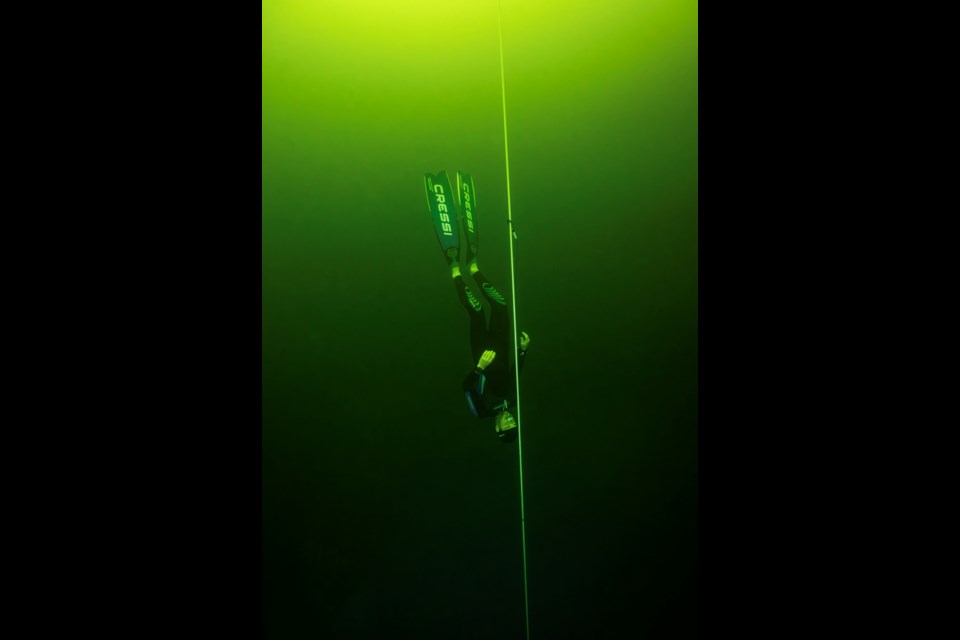MEXICO – During the first 30 metres of underwater freediving, the pressure from sinking deeper starts constricting the human body. The sunlight from the surface begins to fade with every metre down into the dark depths, and the urge to struggle and kick back up to the breezy fresh air flashes in the back of the mind.
It’s the beginning of a tit-for-tat chess battle between body and mind for Banff’s Thibault De Sainte Maresville.
“There’s a lot of little voices in your head that will say you’re not making it or something,” he said.
Pushing deeper down, the pressure begins to ease for the trained freediver, who’s focusing on relaxing himself as the minutes tick away without having a single gasp for air.
Five minutes is the longest the Banff diver has held his breath, while training static, where his head is just below the surface of the water and he’s not moving. It’s a different dynamic while descending to incredible depths and being used to having a lack of oxygen is mandatory.
Reaching 61m below the surface, De Sainte Maresville, fully aware of his body’s limitations, has hit his max and he begins to ascend.
“Sometimes you start to feel an urge to breathe, but the idea is to relax through it because no matter how bad the situation could be, the best thing you can do is relax as much as possible,” said De Sainte Maresville. “If you freak out and think ‘I can’t breathe’ then that’s not going to help.”
The Banff freediver has been challenging himself in watery depths for years, and recently, he participated in his first competition, the Azul FreeDiving Challenge in Playa del Carmen, Mexico, where he finished first in the beginner category and fifth overall. At its core, freediving is holding your breath in water and diving as far down as one can go.
During the three-day competition from May 24-26, divers tested themselves in free immersion, where a diver cannot use fins, but instead, can pull on a rope for descent and ascent; no fin, in which the diver uses no fins on their feet to dive and ascend; and bi fin, where the diver can ascend and descend with bi-fins using flutter kick.
De Sainte Maresville went down 53m in bi-fin on day one. He followed up with a 38m dive for the no fin on the second. On day three, he sunk down 61m in free immersion, a personal best, and was underwater for two minutes and 20 seconds. A safety team member is present with divers.
He hoped to hit a depth of 65m in free immersion, but there will always be more competitions in the future.
An addict for testing himself, De Sainte Maresville is a freeride skiing coach at Lake Louise in winter, a hiking guide in Banff National Park in summer, and he’s also a certified instructor for freediving.
He’ll do his breathing and stretching training techniques in Alberta, but will rarely practice in the frigid glacier-fed waters around Banff. Instead, De Sainte Maresville elects to travel to the hotter climate of Mexico and the Caribbean for his underwater drills.
It was in Utila, a small island off Honduras in Central America, where he got hooked on the underwater challenge. Only planning on being on the island for a few days, he ended up staying 10 to continue dunking himself underwater.
He said it’s dangerous for someone to hold their breath without anyone close by, but it’s safe with trained instructors.
On the competition side, breaking records, at least for now, isn’t on De Sainte Maresville’s mind. He said he finds a certain, hard-to-explain freedom when he’s submerged in great depths.
“A lot of people consider it very stressful, but I find it the opposite,” said De Sainte Maresville.
“It’s about relaxing and feeling comfortable. Once you just try it a little bit with an instructor and you know what’s going to happen, it’s a lot better than what people think.”
Currently, the world records for free immersion are 128m for men and 101m for women. For bi-fin, it’s 121m for men and 109m for women, and in no fin, it’s 103m for men and 76m for women.




